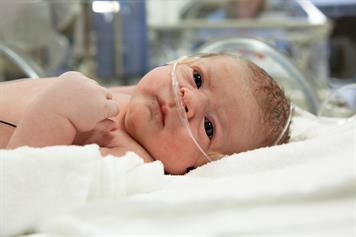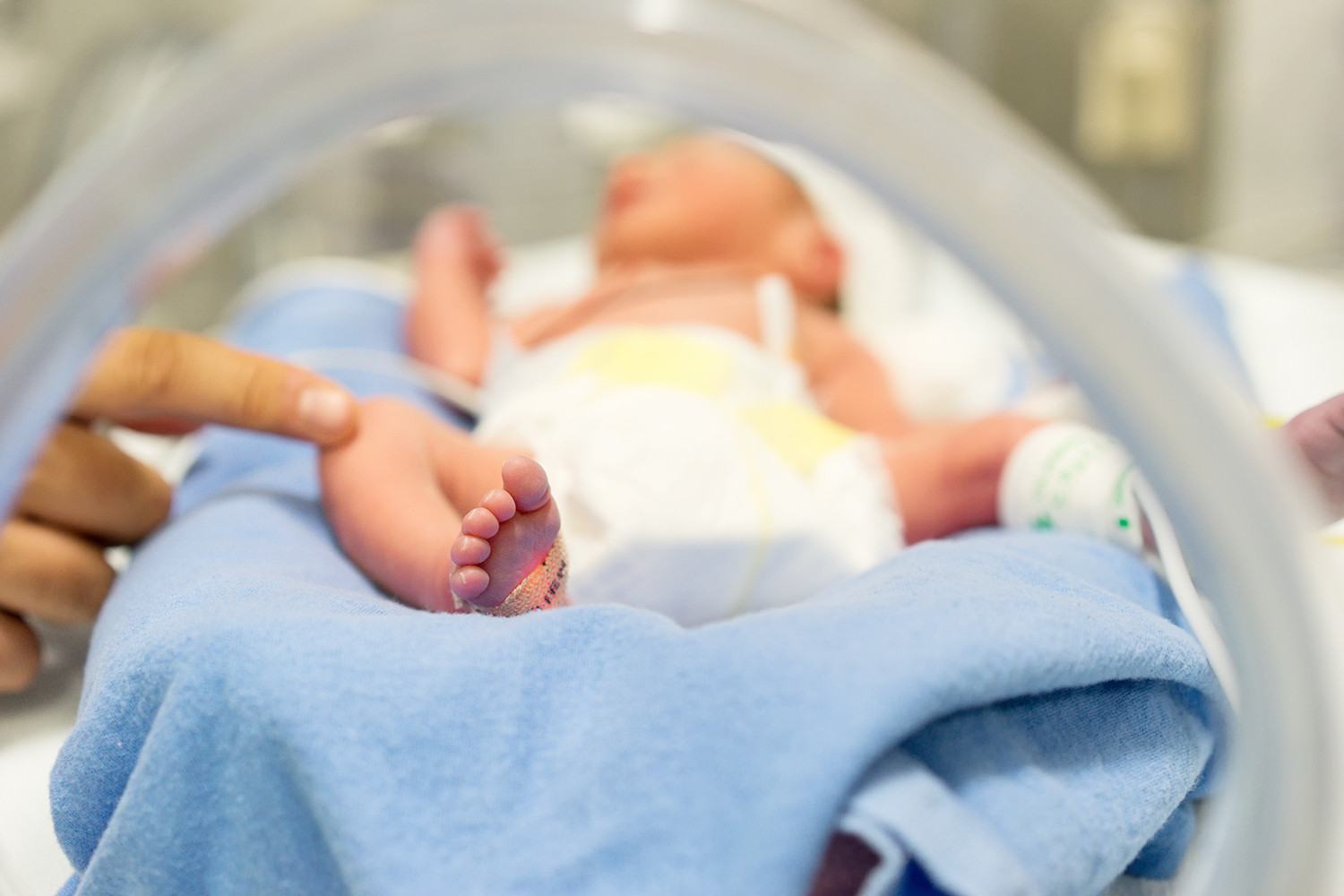Definisi
Bayi prematur adalah bayi yang lahir hidup pada usia kehamilan kurang dari 37 minggu. Semakin dini bayi lahir, maka akan semakin besar pula risiko kecacatan dan kematian bayi.
Diperkirakan setiap tahunnya terdapat 15 juta bayi dilahirkan sebelum waktunya atau terlalu dini. Bayi yang lahir prematur, terutama yang lahir dengan umur yang sangat muda, seringkali memiliki masalah kesehatan yang beragam.
Sekitar 1 juta bayi meninggal setiap tahunnya akibat komplikasi dari kelahiran prematur. Banyak bayi yang lahir prematur mengalami cacat, seperti gangguan penglihatan atau pendengaran dan kemampuan belajar yang buruk.
Terdapat 4 kategori kelahiran prematur berdasarkan usia kehamilan, yaitu:
- Late preterm, adalah bayi yang lahir antara usia kehamilan 34-36 minggu.
- Moderately preterm, bayi yang lahir antara usia kehamilan 32-34 minggu.
- Very preterm, bayi yang lahir antara usia kehamilan 32-28 minggu.
- Extremely preterm, bayi yang lahir pada usia kehamilan kurang dari 28 minggu.
Kebanyakan bayi prematur merupakan bayi yang lahir pada kategori late preterm.
Penyebab
Kelahiran prematur dapat disebabkan banyak hal. Sebagian besar kasus kelahiran prematur terjadi secara spontan tanpa penyebab yang jelas, namun sebagiannya lagi dapat disebabkan adanya kondisi medis tertentu, seperti infeksi, atau komplikasi kehamilan lainnya yang memerlukan persalinan segera.
Penyabab lain dari kelahiran prematur antara lain:
- Kehamilan kembar
- Infeksi
- Penyakit kronis, seperti diabetes dan hipertensi
Baca Juga: Penyakit Diabetes Gestasional - Definisi, Penyebab, Gejala, dan Tata Laksana | AI Care (ai-care.id)
Faktor Risiko
Meskipun penyebab spesifik dari kelahiran prematur belum jelas, namun ada beberapa faktor yang dapat meningkatkan risiko seorang ibu mengalami kelahiran prematur, yaitu:
- Memiliki riwayat melahirkan bayi prematur pada persalinan sebelumnya
- Hamil kembar (kembar dua, tiga, atau lebih)
- Penggunaan rokok dan obat-obatan terlarang saat hamil
- Jarak kehamilan terlalu dekat (< 18 bulan)
- Saat hamil, ibu berusia < 20 tahun atau > 40 tahun
- Permasalahan rahim
- Memiliki riwayat keguguran atau aborsi lebih dari satu kali
- Ibu yang memiliki berat badan rendah sebelum kehamilan
- Cedera fisik
Gejala
Bayi yang lahir prematur mungkin akan memiliki masalah kesehatan yang ringan hingga serius. Berikut adalah tanda dari bayi prematur:
- Ukuran bayi kecil, dengan ukuran kepala lebih besar
- Adanya rambut halus (lanugo) yang menutupi hampir seluruh tubuh
- Suhu tubuh bayi rendah
- Mengalami gangguan pernapasan
- Masalah dalam makan karena bayi belum bisa mengisap atau menelan secara sempurna
- Kurangnya lemak tubuh sehingga bayi tampak tidak sebulat bayi yang lahir normal
Diagnosis
Bayi yang lahir prematur akan segera dipindahkan ke ruangan intensif khusus bayi baru lahir (NICU). Selanjutnya, dokter akan melakukan beberapa pemeriksaan. Jika didapatkan adanya komplikasi pada bayi maka dokter akan melakukan tindakan segera.
Beberapa pemeriksaan yang dapat dilakukan, antara lain:
- Memonitor pernapasan dan denyut jantung. Bayi yang lahir prematur akan dipantau pernapasan dan kondisi jantungnya. Tekanan darah juga akan sering dipantau untuk menilai kondisi bayi.
- Memonitor cairan. Cairan yang masuk dan keluar akan dipantau dengan ketat oleh dokter.
- Tes darah. Tes darah dilakukan untuk melihat kadar kalsium, gula darah dan kadar bilirubin pada bayi. Selain itu, tes darah juga dapat melihat apakah terdapat kemungkinan infeksi pada bayi.
- Ekokardiografi. Pemeriksaan ini dilakukan untuk memeriksa kondisi dan struktur jantung bayi.
- USG. Pemeriksaan ini berfungsi untuk melihat apakah ada kelainan pada otak, saluran pencernaan, hati atau ginjal bayi.
- Pemeriksaan mata. Pemeriksaan ini dilakukan untuk memeriksa kondisi mata dan penglihatan bayi.
Jika bayi mengalami masalah kesehatan lain, dokter mungkin memerlukan pemeriksaan lebih lanjut.
Tata Laksana
Bayi prematur memerlukan perawatan khusus di ruang perawatan intensif (NICU). Beberapa bayi memerlukan perawatan selama berminggu-minggu hingga berbulan-bulan di ruang NICU.
Berikut beberapa perawatan yang akan dilakukan pada bayi prematur:
Perawatan Suportif
- Bayi akan diletakkan di inkubator. Tujuan dari hal ini adalah untuk menjaga bayi agar tetap hangat.
- Memantau tanda-tanda vital. Dokter akan memantau tekanan darah, denyut jantung, laju nafas, dan suhu tubuh bayi.
- Memasang selang makan (feeding tube). Kemampuan mengisap dan menelan bayi prematur masih belum sempurna sehingga perlu bantuan selang yang dipasang melalui hidung untuk mendapatkan asupan makanan.
- Mencukupi kebutuhan cairan.
- Melakukan fototerapi pada bayi yang kuning.
- Melakukan transfusi darah. Jika bayi prematur mengalami kekurangan darah (anemia), dokter dapat melalukan transfusi darah.
Pemberian Obat-obatan
Dokter akan memberikan obat-obatan tergantung dengan kondisi bayi, misalnya dokter dapat memberikan obat antibiotik jika bayi mengalami infeksi bakteri.
Adapun obat-obatan lain yang diberikan dokter, antara lain:
- Surfaktan, merupakan obat yang digunakan untuk mengobati masalah pernapasan
- Obat diuresis, jika bayi mengalami kelebihan cairan
- Antibiotik untuk mengobati infeksi bakteri atau jika terdapat risiko terhadap infeksi bakteri
Pembedahan
Pembedahan dapat dilakukan untuk mengatasi masalah kesehatan pada bayi prematur. Misalnya, jika bayi mengalami gangguan struktural pada jantung, dokter mungkin akan menyarankan untuk dilakukan operasi pada jantung.
Komplikasi
Janin membutuhkan waktu selama kurang lebih 40 minggu di dalam rahim untuk tumbuh dan berkembang secara sempurna. Jika janin dilahirkan terlalu dini, janin belum berkembang dengan sempurna. Hal inilah yang menyebabkan munculnya berbagai masalah kesehatan pada bayi prematur.
Komplikasi yang dapat terjadi pada bayi prematur adalah sebagai berikut:
- Masalah pernapasan. Bayi prematur mungkin akan memiliki masalah pernapasan karena perkembangan paru-paru belum sempurna.
- Masalah jantung. Masalah jantung yang paling sering pada bayi prematur adalah patent ductus arteriosus (PDA) dan tekanan darah rendah (hipotensi). PDA merupakan sebuah lubang tidak normal antara aorta (pembuluh nadi terbesar pada tubuh) dan pembuluh nadi paru.
- Masalah otak. Semakin dini bayi lahir, risiko untuk terjadinya perdarahan di otak (interventricular hemorraghes) semakin besar.
- Masalah pada pengaturan suhu tubuh. Bayi prematur dapat kehilangan panas tubuh dengan cepat sehingga berisiko mengalami hipotermia (suhu tubuh turun di bawah suhu normal).
- Masalah pencernaan. Bayi prematur mungkin akan mengalami gangguan pencernaan karena pencernaan yang belum berkembang sempurna. Gangguan yang dapat muncul adalah enterokolitis nekrotikans atau NEC (Necrotizing Enterocolitis). Penyakit ini merupakan penyakit serius yang menyebabkan kerusakan dan kematian jaringan usus.
- Masalah darah. Bayi prematur seringkali mengalami anemia dan ikterus neonatorum. Anemia adalah kondisi dimana tubuh kekurangan sel darah merah untuk mengantarkan oksigen ke seluruh tubuh. Sedangkan ikterus neonatorum adalah perubahan warna kulit dan mata bayi menjadi kekuningan disebabkan oleh kelebihan bilirubin.
- Masalah metabolisme. Bayi prematur mungkin mengalami masalah dengan metabolisme tubuh. Sebagian akan mengalami hipoglikemia (kekurangan gula darah) . Hal ini terjadi karena bayi prematur memiliki simpanan gula yang sangat rendah.
- Masalah sistem imun. Bayi prematur memiliki sistem imun yang belum berkembang dengan baik sehingga bayi akan rentan terhadap infeksi. Infeksi yang terjadi pada bayi prematur dapat cepat menyebar ke darah, menyebabkan sepsis, dan berisiko menyebabkan kematian pada bayi.
Bayi prematur berisiko lebih tinggi mengalami masalah perkembangan. Bayi yang lahir prematur mungkin juga akan memiliki masalah kesehatan di kemudian hari, seperti:
- Cerebral palsy. Merupakan suatu penyakit yang memengaruhi gerakan, otot, dan postur tubuh. ‘Cerebral’ berarti kondisi ini berhubungan dengan otak, sedangkan ‘palsy’ merujuk pada kelemahan atau masalah pada otot
- Gangguan pada penglihatan dan pendengaran
- Kesulitan belajar
- Gangguan pertumbuhan atau pertumbuhan yang buruk
Baca Juga: Penyakit Cerebral Palsy - Definisi, Penyebab, Gejala, dan Tata Laksana | AI Care (ai-care.id)
Pencegahan
Tidak ada cara khusus untuk mencegah kelahiran prematur, tetapi Anda dapat melakukan hal berikut untuk mengurangi risiko persalinan prematur:
- Tidak merokok, minum alkohol atau mengonsumsi obat-obatan terlarang saat hamil
- Mengonsumsi makanan yang sehat dan bergizi seimbang
- Rutin melakukan pemeriksaan saat hamil
- Hindari stres
- Beri jarak pada kehamilan selanjutnya setidaknya selama 18 bulan
Kapan Harus ke Dokter ?
Bayi prematur rentan mengalami berbagai masalah kesehatan. Jika saat di rumah bayi Anda mengalami masalah pernapasan seperti sulit bernapas atau sesak napas, bayi tampak kuning, demam, atau tidak mau menyusu, segera bawa bayi ke rumah sakit terdekat.
Mau tahu informasi seputar penyakit lainnya? Cek di sini, ya!
- dr Nadia Opmalina
Mayo Clinic Staff. 2023. Premature Birth. MayoClinic. Available from: https://www.mayoclinic.org/diseases-conditions/premature-birth/symptoms-causes/syc-20376730
WHO. 2022. Preterm Birth. World Health Organization. Available from: https://www.who.int/news-room/fact-sheets/detail/preterm-birth
CDC. 2022. Premature Birth. Centers for Disease Control and Prevention. Available from: https://www.cdc.gov/reproductivehealth/features/premature-birth/index.html
Claveland Clinic. 2021. Premature Birth. Ohio: Claveland Clinic. Available from: https://my.clevelandclinic.org/health/diseases/21479-premature-birth
Suman V, Luther EE. Preterm Labor. [Updated 2022 Aug 8]. In: StatPearls [Internet]. Treasure Island (FL): StatPearls Publishing; 2023 Jan-. Available from: https://www.ncbi.nlm.nih.gov/books/NBK536939/












